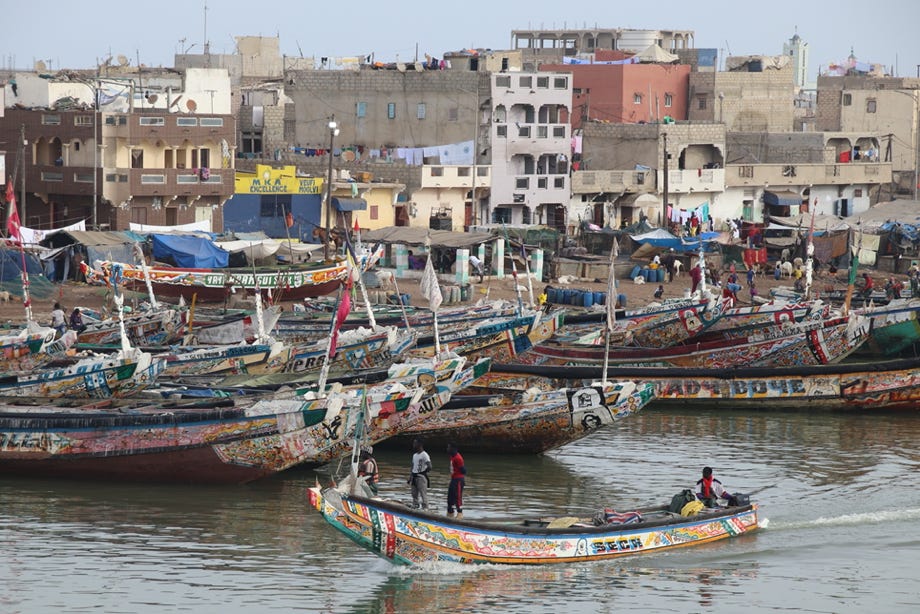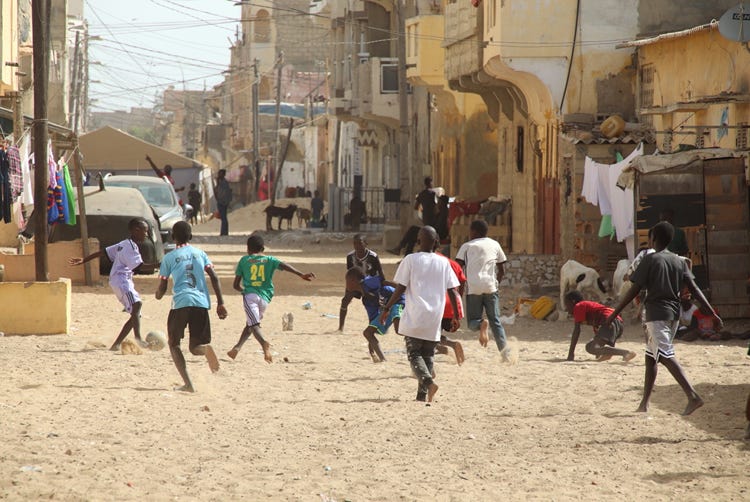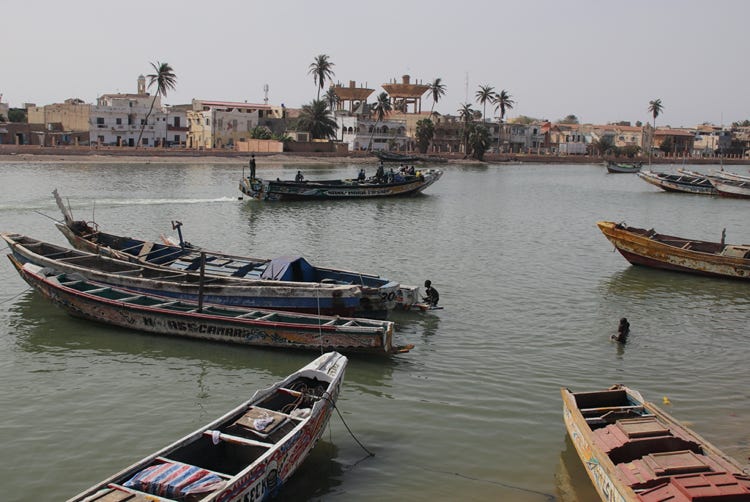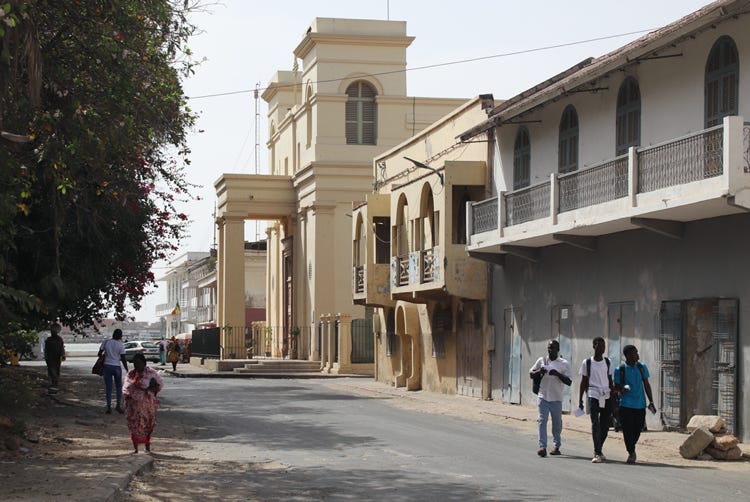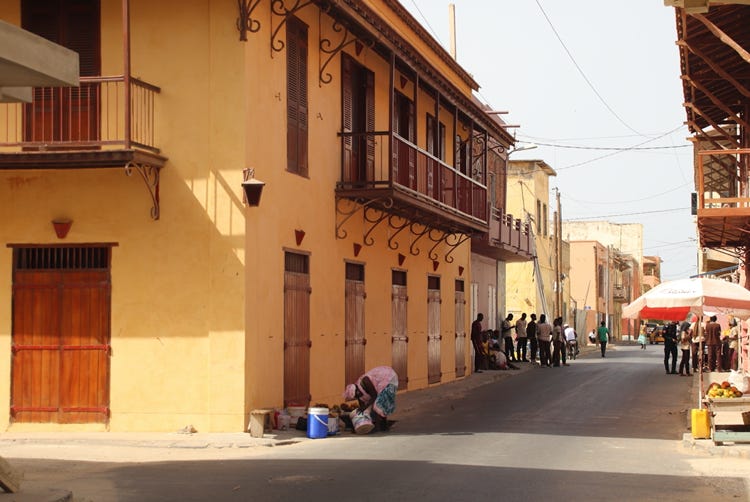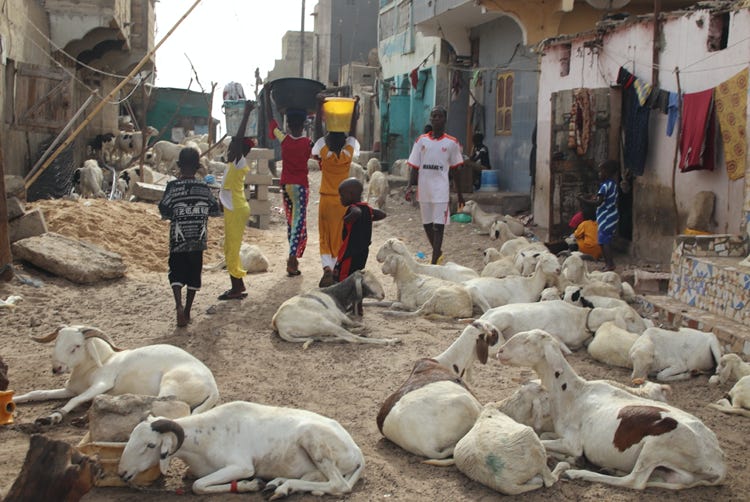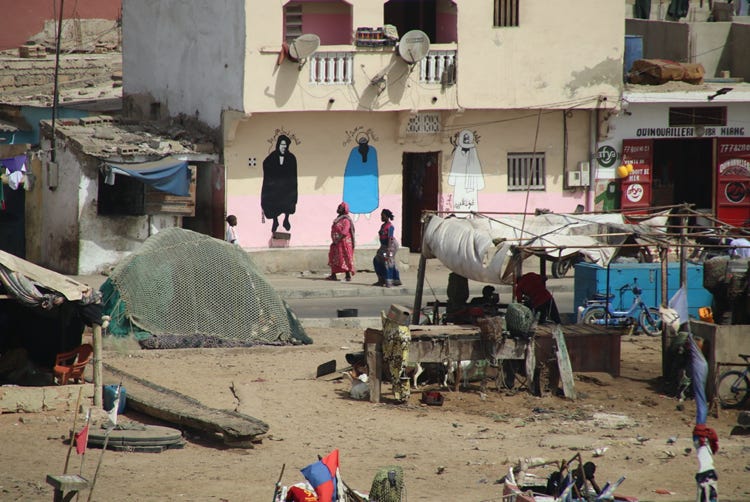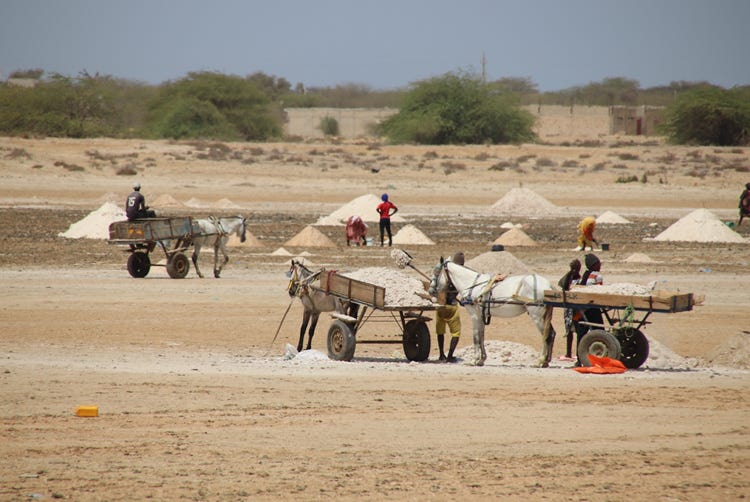
Today was quite an extreme mix of ups and downs. The ‘ups’ were fabulous but mainly in the morning, while the ‘downs’ emerged very sharply in the afternoon.
I managed to get a fairly good sleep despite the uncomfortable bed and exterior noise, and enjoyed a simple breakfast at about 7:30am. This timing meant that I had a few hours available to explore Saint-Louis before setting off for the return drive south to Dakar.
Not wanting simply to repeat yesterday afternoon’s walk, I concentrated on the area north of Guet N’Dar known as N’Dar Tout. It was fascinating, and had I not seen Guet N’dar I might even have said that it was a highlight of the trip – but I have to say that Guet N’Dar wins that prize. Perhaps the thing I enjoyed most were the views from my own balcony as the morning light illuminated the colours and activity of the river and Guet N’Dar to perfection.
I set off on the drive back to Dakar at a little before 11:00am. I filled the petrol tank of my car before leaving Saint’Louis, a task that required two different petrol pumps and 20 minutes of time.
Rather than repeat the coastal route for the drive south, I took the more inland route of the main highway. Although this was equivalent in distance, it was a faster, easier drive as the condition of the road was excellent for almost the entire way and there were fewer settlements to slow progress. Having said that, the extensive salt mining on the evaporation flats just south of Saint-Louis were fascinating and certainly justified my short stop there.
The inland route I was following passed through a large town called Thiès. For some reason there were lots of road closures as the police diverted traffic along circuitous side roads. It was all quite chaotic and I was very relived to be using Google maps on my phone to sort through the constantly changing mess.
After I found my way out of the traffic chaos, driving became much easier, especially when I reached the main tollway into Dakar (the same one as I had used from the airport when I arrived). As I got closer to Dakar I saw some thick, high plumes of black smoke up ahead, and then to my surprise I saw a smaller fire spreading to form a line across the road ahead of me blocking the way.
I slowed down to avoid the fire which seemed to have been formed along a line of leaves, grass and twigs across all three lanes of the tollway. As I did so, six young men jumped out from behind the concrete barrier at the edge of the road and swarmed my car, opening all four doors simultaneously.
As one man opened the door beside me he leaned in and started shouting threateningly and aggressively, while simultaneously one of his bandit mates leaned in through the front passenger’s door and grabbed by backpack containing my iPad and laptop computer, my iPhone (that I was using for Google Maps navigation), and my camera. There was nothing in the back of the car, and although another man tried to open the car’s boot, he didn’t manage to do so before he panicked (as lots of other cars were stopping near us) and ran away. The whole incident didn’t last more than five seconds, by which time all six bandits jumped over the concrete barrier beside the road, ran down the steep slope, jumped another fence and disappeared into the trees that surrounded the nearby houses.
As they ran away, one man slammed (or dropped) my camera on the roadway which smashed it into pieces, and then threw the remains back into the car – for which (perhaps perversely) I was grateful because it meant I still had the SD card with all the camera’s photos from this trip. (The only backup I had was on the laptop that was stolen).
It was fortunate – some might say miraculous – that they didn’t manage to open the car’s unlocked boot because it contained the bag with my passport, credit cards, cash and documentation for the trip. There is no Australian diplomatic representation in Senegal (the nearest embassy being in Accra, Ghana), and the consequences of losing such important documents in Senegal doesn’t bear contemplation.
Equally miraculously, neither the rental car I was driving nor I were harmed. I say this because I found out later that that the larger fire down the road ahead of me was four cars that had been set ablaze as part of riots that had begun that morning following the release of the verdict in a sensitive political court case. Unknown to me, the riots in Dakar that day had already resulted in nine deaths and many (somewhere between 20 and 60) cars set ablaze.
More than a little shaken by this experience, I drove onwards and after a kilometre or so I saw the Gendarmerie officers who were trying to create order near the cars that had been set on fire. I stopped and reported what had happened to me, and they advised me to proceed to the next toll gate and inform the Gendarmerie officer-in-charge there.
I did so, but he told me this was not a matter for the Gendarmerie and I should report the matter to the toll booth officials. I found them and did that (my schoolboy French was becoming quite animated by this stage), but although they were sympathetic, they said there was nothing they could (or would) do for me, such as providing me with a written report. They just said I had to accept the fact that the stolen objects were gone forever.
There was nothing else to do but continue my drive into Dakar. I had lost my navigation assistance from my phone, but fortunately I was able to remember the route. However, as I drove into the city of Dakar I was amazed to see the streets almost completely deserted. I had anticipated Dakar’s typical traffic congestion but instead I found I was almost the only car on the road. It was surreal – a deserted city!
I found a petrol station that was open, filled the car’s fuel tank, and found my way back to the Hertz office to return the car, where I explained what had happened to me. The staff there were simultaneously horrified, embarrassed and sympathetic, and they briefed me on the reasons the streets were deserted, the shops were closed, why the children had all been sent home from school, and so on.
The Hertz manager promised to provide me with a written report, and he even had the clarity of mind to take photos of the remains of the smashed camera (because obviously I couldn’t do so). He even drove me back to my hotel (just 650 metres away) in case walking along the streets might not be safe that evening.
As I checked into my hotel (the Pullman once again), I was describing my ordeal to the check-in staff. They were incredibly supportive, even letting me send e-mails home from their front office e-mail address because I didn’t have the clarity of mind to remember the access credentials to my own accounts. I needed to phone my travel insurers in Australia to report the incident, and when we found the hotel’s phones couldn’t handle the technology of the “Press 1 now” option, one of the front office staff lent me his personal mobile phone to make the call.
My long day finished when I received a beautiful and completely unexpected phone call from my concerned daughter and teary wife – knowing they cared enough to phone me was just the tonic I needed to get at least a little sleep.



